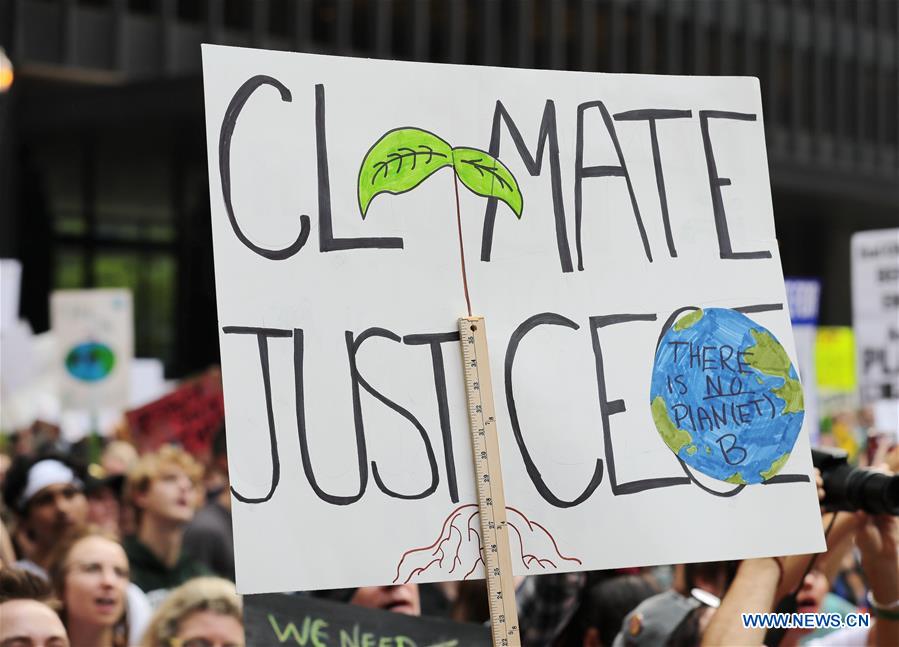Making sense of the UN climate summit
- By Niranjan Sahoo
 0 Comment(s)
0 Comment(s) Print
Print E-mail China.org.cn, October 14, 2019
E-mail China.org.cn, October 14, 2019

The much-anticipated UN Climate Action Summit (UNCAS) in New York on Sept. 23 concluded with little to show in terms of fulfilling promises made in 2015 Paris climate accord. Notwithstanding the euphoria generated by Swedish phenom Greta Thunberg, a teenage climate activist, and millions of youth marching in as many as 100 countries, the crucial event turned out to be a disappointment as several key member nations refused to take the summit and its agenda seriously.
Positive outcomes, too little too late?
Nonetheless, the summit did generate some positive outcomes, with 80 member countries and over 100 cities across the world pledging to achieve net-zero greenhouse emissions over the next three decades. While some developing countries pledged to end coal use, a few also renewed commitments to direct more funds to the Green Climate Fund.
Still, these measures will fall far short of addressing the target set by the Intergovernmental Panel on Climate Change of limiting global warming to 1.5 degrees Celsius.
This is in light of a new report compiled by the World Meteorological Organization (WMO) warning that carbon dioxide levels are increasing faster than expected and sea levels are rising more rapidly as ice sheets melt faster than previously thought. Additionally, the average global temperatures for 2015 to 2019 were shown to be the highest of any five-year period recorded so far. The report further highlighted the alarming acceleration of global temperature (0.2C) between 2011 and 2019, linked largely to growing carbon emissions, which were 20% more than in the five years previous. In short, the report sheds new light on climbing global temperatures and the alarming rise in sea levels.
Extreme weather events of late validate the findings of the report and its dire warning. Southern Europe experienced unprecedented heat this summer, while Hurricane Dorian battered large parts of the Bahamas. Scientists have recently established the concrete link between these events and climate change, claiming that the heat waves in France and Germany were amplified eight to 10 times due to climate change.
Is rising nationalism hindering the climate fight?
What is standing in the way of the global commitment to fight against climate change? The foremost reason seems to be the rise of populist nationalism that flies in the face of collective action needed to check planet-harming activities. National politics in many countries are turning inward and parochial, increasingly becoming trapped in vote-bank politics often at war with global initiatives such as free trade and climate change. For example, populist nationalism is driving policies in the Latin American region as we speak, at the cost of the fragile Amazon ecosystem. Such dealings have influenced other world leaders to tone down their commitment to the climate fight.

However, it would not be fair to paint nationalism as the main villain. In fact, in another part of the globe, the Global South, it is triggering impressive initiatives. At the forefront are China and India, two large developing countries that NASA's Earth Observatory recently praised for together driving one-third of global greening since 2000s. Notwithstanding the Western flip-flops, China has shown renewed commitment to the global fight against climate change. Not only is China's level of investment in renewable energy, at nearly $100 billion, unmatched by any nation, but it is also inching steadily toward creating a national carbon market for all industries. All this, plus earmarking a $3 billion fund to encourage climate beneficial initiatives in the Global South, places China in the role of a climate leader.
India, too, under the leadership of Narendra Modi has shown great resolve and commitment to reduce its dependency on fossil fuels. While attending the climate summit, Modi highlighted India's commitment by announcing India's non-fossil fuel target will be increased to 450 GW by 2022. He was by no means playing to the gallery; India, which already plans to cut its dependency on fossil fuels by 40% by shifting to renewable, has already cut its emissions intensity by 13.5% between 2005 and 2012. In short, the fight against climate change is not lost yet, as China and India have taken on a large part of the mantle of leadership.
With the younger population leading the fight, and teenagers like Greta Thunberg becoming symbols of this collective struggle, China and India must make use of such an opening in their global leadership. The missing critical momentum from civil society to fight against climate change must not be wasted.
Niranjan Sahoo is a columnist with China.org.cn. For more information please visit:
http://m.91dzs.com/opinion/NiranjanSahoo.htm
Opinion articles reflect the views of their authors only, not necessarily those of China.org.cn.
If you would like to contribute, please contact us at opinion@china.org.cn.





